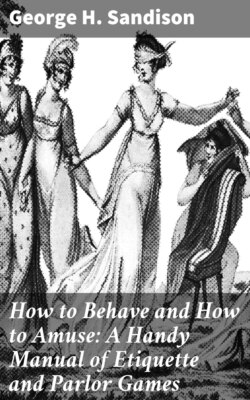Читать книгу How to Behave and How to Amuse: A Handy Manual of Etiquette and Parlor Games - George H. Sandison - Страница 11
На сайте Литреса книга снята с продажи.
A Young Lady’s Début.
ОглавлениеTable of Contents
Social custom, both here and in Europe, has fixed the time for a girl’s formal introduction to society as between the ages of seventeen and twenty. Abroad, the daughter’s début means much more than with ourselves, and the launching of a clever and prepossessing young girl into the fitful sea of social life is quite an important function.
The mother invites only suitable people to her house, where she may present her daughter to them as a member of their circle. This act conveys the information to the polite world that the young lady has been graduated in all the accomplishments and knowledge necessary as the equipment of a woman of society.
Just previous to her formal presentation or début, her mother and her elder unmarried sisters—if any—pay visits, or at least leave their own with their fathers’ and brothers’ cards, upon all acquaintances whom they intend to invite to be present at the début. Engraved invitations follow this formality, and they are issued about ten days previous to the event. If they are sent by mail, an extra outer envelope incloses all the invitations that are directed to one family. If delivered by messenger, the outer wrap is no longer used. The mail has become as suitable a method as any for conveying social messages. One envelope is directed to Mr. and Mrs. A. If there are more daughters than one, the address is, “Misses A.,” or, if preferred, “The Misses A.” Each son receives a separate invitation; it is the custom. Replies are sent in the names of the parties addressed on the envelopes. The invitation is engraved in script, or, if crest or cipher be used, it may be placed on the envelope, and is in form similar to that used for parties. Cards have been used on which the special purpose of the party is stated, with the name of the young lady who is to make her début engraved upon them; but this is seldom done, and is not considered in the best possible taste. The following is the formula if such a card is used:
MR. AND MRS. B. N. JONES
request the pleasure of presenting their
eldest [or second, etc.,] daughter,
Miss Ada Anna,
to
… … … … … … … … … … … … … … . … .
on Wednesday evening, April 11, at half-past
eight o’clock.
No. 2002 Fifth Avenue.
A preferable method is simply to inclose the card of the young lady in the envelope containing the invitation.
The reply is written and forwarded directly, and corresponds in style to the invitation, in the following manner:
MR. AND MRS. E. DE PEYSTER
accept with pleasure Mr. and Mrs. B. N. Jones’ kind invitation for Wednesday evening, April 11th. No. 969 Irving Place. March 12th.
The young ladies use the same form, and commence their note with “The Misses Jones,” or in whatever style the invitation is sent to them. Young gentlemen follow the same custom. Intimate friends may send flowers on the day of the young girl’s first appearance, if they please; but it is not an inflexible custom.
The young lady stands at the left of the mother during the reception of guests, and is presented to her elders and to ladies. Of course, welcomes and brief congratulatory compliments are offered to her by each guest, and then place is made for the presentation of others who are arriving. When supper is announced, the brother or father escorts the young lady to the table, and the mother follows, accompanied by some honored gentleman guest. If the brother takes the young lady in, the father leads the way with the eldest or most distinguished lady of the party.
Visits of ceremony paid to the hostess following this entertainment should include this young lady, but during her first season in society she has no card of her own, and does not pay formal visits alone. If she be the eldest unwed daughter, her name is engraved as Miss Jones, beneath that of her mother. If she have elder sisters at home, her name is engraved as Miss Ada Anna Jones. During this first season she does not receive visits from gentlemen without a chaperon under any circumstances. If her mother be unable to receive with her, she politely declines a visit. After the first season, her own separate card may be left, either alone or with those of other members of her family. This formality past, she may be considered launched into the world of social intercourse.
Young gentlemen on the other hand, enter society without formality, and without much difficulty. A youth usually begins by endeavoring to assist his mother at her entertainments, and by being an escort to his sisters on informal evening visits among lady acquaintances where his agreeable traits win him a future invitation.
